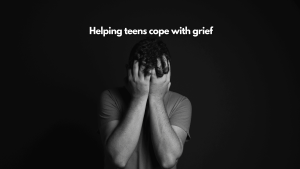Teen dating violence is an alarming but often overlooked issue. While parents focus on academic success and extracurricular activities, helping teens develop healthy relationship skills is just as crucial.
According to a Chapman University study, two out of three Orange County teens have experienced an abusive relationship before turning 18—double the national average. Many young people don’t recognize they’re in an unhealthy relationship until the abuse escalates.
As teens spend more time online and on social media, digital abuse and online coercion have become major concerns in teen dating. Parents must adopt proactive strategies to identify warning signs, initiate meaningful discussions, and safeguard their children from relationship abuse, both online and offline.
In our recent Cyber Safety Cop webinar, “Navigating Teen Dating: Building Safety and Resilience Against Dating Violence,” we covered:
-
The warning signs of dating abuse, including digital coercion
-
How parents can teach trust, respect, and safety in relationships
-
How to create a safe exit strategy for teens in abusive situations
If you want proven strategies to help your teen navigate dating safely, the full webinar replay is now available.
What is Teen Dating Violence?
Teen dating violence (TDV) includes physical, emotional, digital, financial, and sexual abuse. It often starts subtly—through control and coercion—before escalating. Many teens don’t recognize the warning signs until it’s too late.
Common Signs of an Abusive Relationship
Emotional Manipulation & Control
-
Extreme jealousy or possessiveness
-
Controlling behaviors disguised as “protection” (e.g., dictating who their partner can talk to, what they can wear)
-
Constant criticism, humiliation, or guilt-tripping
Coercion & Pressure
-
Pressuring a partner into sexual activity or ignoring consent
-
Using guilt or threats to control behavior
-
Making their partner feel guilty for setting boundaries
Isolation from Friends & Family
-
Discouraging their partner from spending time with loved ones
-
Insisting on constant contact or excessive “checking in”
-
Manipulating them into cutting ties with friends
Digital Abuse & Sextortion
-
Demanding access to passwords, texts, or social media accounts
-
Tracking their location using apps without permission
-
Using explicit photos as blackmail (a common sextortion tactic)
-
Threatening to share personal photos or messages
Physical Aggression
-
Pushing, shoving, or grabbing during arguments
-
Strangulation or choking, a major red flag, indicates victims are 750% more likely to be killed in future attacks.
Parents must educate teens early to help them recognize abuse and protect themselves from both physical and digital threats.
How Parents Can Help Their Teen Navigate Dating Safely
Many teens don’t recognize abuse, and most won’t report it. Instead, they justify unhealthy behaviors as “normal” or as a sign of love. This is why proactive parenting is key.
How to Start the Conversation with Your Teen
Teach the Three Pillars of a Healthy Relationship
-
Trust – Open communication, honesty, and reliability
-
Respect – Valuing each other’s opinions and boundaries
-
Safety – Feeling emotionally and physically secure
Encourage your teen to reflect on what trust, respect, and safety mean to them. This helps them establish personal relationship boundaries before they start dating.
Use Pop Culture & Social Media as a Teaching Tool
-
Watch TV shows, movies, or TikTok trends together and discuss how relationships are portrayed.
-
Ask open-ended questions like, “Would you be okay with that in real life?”
-
Avoid banning content outright—instead, use it as an opportunity to guide their thinking.
Help Your Teen Set “Negotiables” and “Non-Negotiables”
-
Negotiables: Preferences in a partner (e.g., shared interests, hobbies, personality traits).
-
Non-Negotiables: Deal-breakers (e.g., jealousy, control, physical aggression, sextortion).
Encourage your teen to list down their own relationship boundaries before they start dating.
Encourage Multiple Trusted Adults
-
Let your teen know they can always come to you, but also encourage them to identify another trusted adult (e.g., a teacher, coach, or family friend).
-
Many teens fear disappointing their parents—having a backup support system is critical.
Provide a Safe Exit Strategy
-
Create a secret code word your teen can text you if they need an excuse to leave a situation.
-
Reassure them that if they ever call you for help, you won’t ask questions in the moment—you’ll just come get them.
Conclusion: Helping Teens Build Safe & Healthy Relationships
Teen dating violence is a serious issue, but with early education, open conversations, and proactive safety strategies, parents can help their children navigate relationships with confidence and awareness. By discussing trust, respect, and safety, setting clear boundaries, and using digital safety tools, you can protect your teen from unhealthy relationships—both online and offline.
If you’d like to explore this topic further, we offer several expert resources to help families address teen dating safety and online relationship risks.
✔ Watch the Webinar Replay: Our “Navigating Teen Dating: Building Safety and Resilience Against Dating Violence” webinar provides a deep dive into the warning signs of abuse, digital coercion, and expert strategies for keeping teens safe.
✔ Join Our Cyber Safety Seminar for Parents: This 90-minute session empowers parents with the knowledge to navigate online challenges, protect kids from digital risks, and create a healthy tech balance at home.
✔ Take the Digital Parenting 101 Course: Our comprehensive course provides step-by-step guidance on helping your child safely navigate the digital world while fostering positive online habits.
✔ Read “Parenting in the Digital World“: Clayton Cranford’s expert guide provides practical steps for protecting children from online threats, sextortion, and digital abuse—a must-read for any parent navigating today’s digital landscape.
By taking advantage of these proven strategies and expert resources, you can equip your teen with the tools they need to build safe, respectful relationships. Together, we can create a safer, more informed future for the next generation—both in their personal lives and online.






